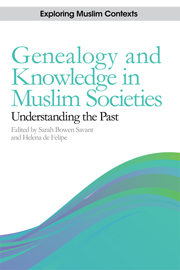Book contents
- Frontmatter
- Contents
- List of Figures and Tables
- Introduction
- Part One The Generation of Genealogical Knowledge
- Part Two Empowering Political and Religious Elites
- Part Three Genealogy as a Source for Writing History
- 7 Was Marwan ibn al-Hakam the First “Real” Muslim?
- 8 Genealogy and Ethnogenesis in al-Mas‘udi's Muruj al-dhahab
- 9 Genealogical Prestige and Marriage Strategy among the Ahl al-Bayt: The Case of the al-Sadr Family in Recent Times
- About the Contributors
- Index
7 - Was Marwan ibn al-Hakam the First “Real” Muslim?
from Part Three - Genealogy as a Source for Writing History
Published online by Cambridge University Press: 05 September 2014
- Frontmatter
- Contents
- List of Figures and Tables
- Introduction
- Part One The Generation of Genealogical Knowledge
- Part Two Empowering Political and Religious Elites
- Part Three Genealogy as a Source for Writing History
- 7 Was Marwan ibn al-Hakam the First “Real” Muslim?
- 8 Genealogy and Ethnogenesis in al-Mas‘udi's Muruj al-dhahab
- 9 Genealogical Prestige and Marriage Strategy among the Ahl al-Bayt: The Case of the al-Sadr Family in Recent Times
- About the Contributors
- Index
Summary
Marwan ibn al-Hakam ibn Abi l-‘As, a leading member of the Umayyad family during the first/seventh century and himself briefly amīr al-mu'minīn (“commander of the Believers”) from 64 until 65 AH (684–5 CE), is – like most members of the Umayyad clan – not very favourably remembered by the Islamic historical tradition. The main obstacle standing in the way of achieving a sound assessment of Marwan (or, for that matter, of almost any other figure of his time) is the virtual absence of documentary evidence about him. This forces us to rely on reports found in later narrative sources, in which the surviving historical facts may be unrecoverable or may be totally obscured by masses of partisan invective and later embellishment, added for polemical purposes. This is especially true for figures like Marwan, who were deeply involved in the intense political rivalries that afflicted the early community of Believers, including the infighting that took place within the ruling circles of the new Umayyad regime. While the many reports about the events of their day may provide a fair idea of what the various parties were fighting about, the barrage of charges and counter-charges in these reports often leave the historian completely unable to decide just what the position of any of the main actors was on a particular issue, or even what their actions may have been. Above all, it is difficult to discern what we may call the moral qualities of the protagonists, since the accounts about them usually aim primarily to establish or to undermine precisely these moral qualities.
- Type
- Chapter
- Information
- Genealogy and Knowledge in Muslim SocietiesUnderstanding the Past, pp. 105 - 114Publisher: Edinburgh University PressPrint publication year: 2014



